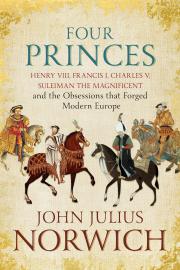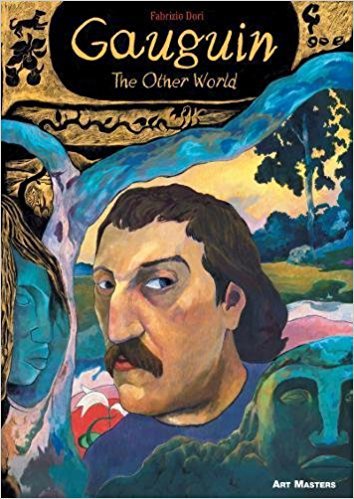

★★★★
Henry VIII, Francis I, Charles V, Suleiman the Magnificent and the Obsessions that Forged Modern Europe
Over the years I’ve assembled a variety of John Julius Norwich’s history books, because he conveniently writes on precisely the topics that fascinate me: Byzantium; Sicily; the Normans in Italy; and so forth. However, although I’ve dipped into all of these books, I’ve rather shamefully never finished any of them, having been distracted for various reasons from savouring Norwich’s sublimely elegant prose. This new history, shorter than the others and full of a delightful liveliness, has the honour of being the first Norwich that I’ve read cover to cover. Taking the unusual format of a group biography, it focuses on the dazzling first half of the 16th century, when four men between them bestrode Europe like colossi. It’s an extremely accessible introduction to the period and the men in question.
Like many people, I suspect, I’m pretty familiar with the life of Henry VIII. I’ve also had numerous encounters with Charles V and Francis I, through their roles as artistic patrons and also their presence as England’s enduring antagonists, both militarily and spiritually. What Norwich does, however, is to stress the connections between them. It’s easy to forget how closely related they all were: the Renaissance marriage-market kept princesses shuttling back and forth across Europe, so that Francis I and Charles V were brothers-in-law, while Charles was briefly Henry’s intended son-in-law, a position later filled by his own son Philip II. And let’s not forget how remarkable it is that these three European personalities all emerged at the same time. Henry and Francis were born three years apart (1491 and 1494 respectively) and spent their lives, on Henry’s part anyway, driven by a desire to outdo the other in chivalry, glamour, manliness and martial deeds. It is as if they needed one another as mirrors of their selves. Indeed, they died only three months apart. Charles, more devout, less frivolous and certainly less handsome, was in the odd situation of being the youngest but also the most powerful. His authority as Holy Roman Empire stretched from Spain to the furthest reaches of Eastern Europe, making him alternately a formidable rival or a valuable ally to the other two squabbling kings.
Most of us will be moderately familiar with the power-struggles of early 16th-century Europe and so much of what Norwich has to say won’t necessarily be new, even if the way he says it puts it back into the context of a close-knit rivalry among three great egos. But the appeal of this book for me, and perhaps for others, was to see how Suleiman fitted into the story. As Norwich points out, Suleiman, along with Lorenzo de’ Medici, is one of only two men to have earned the English soubriquet of ‘the Magnificent’ (even Alexander only managed ‘the Great’). Unfortunately, I felt that he was rather sidelined for much of the book. Norwich’s story takes place almost entirely within the borders of Europe and so we only see Suleiman as and when his story touches on Europe – which is entirely justifiable, given the book’s subtitle. Yet Norwich told me just enough to have me thirsting for more. Suleiman was the only Muslim among the kings, of course, but he was also the most intelligent (in his youth, anyway), the most tolerant (granting freedom of worship and protection to Jews and Christians within his realm), and the most honourable. One feels for him as he makes treaties with European powers who cheerfully break them mere months afterwards. Indeed, the way Norwich described Suleiman made me imagine him as a bemused grown-up watching three pugnacious children fighting in a playground.
Yes, there was so much more I wanted to know about Suleiman. And what of his wife, the intriguing Roxelana, who arranged for her husband’s closest friend Ibrahim Pasha to be assassinated, and who later managed to turn him against his competent son Mustafa so that her own (less promising) son Selim would become his heir? Roxelana sounds like just the kind of sharp, ruthless woman who fascinates me. Norwich laments in his introduction that so little has been written about Suleiman, but he does mention a biography by Antony Bridge (who, you may remember, wrote a book about the Empress Theodora, which I read some years ago). I think I’m going to have to track that down. I’m also keen to go back to Netflix at some point, to watch the Turkish drama Magnificent Century, about Suleiman’s reign and the rise to power of Roxelana herself.
As I hinted earlier, this is lighter than some of Norwich’s earlier books, which means that one sometimes misses the weight of erudition, but on the other hand makes it much easier to devour. He takes a gleefully Gibbonian approach to footnotes, using them for laconic asides or humorous anecdotes: on the Italian explorer Giovanni da Verrazzano, who was the first thorough explorer of the Atlantic coast in 1524 (‘He might have gone even further, had he not in 1528 had the misfortune to be eaten by a Carib tribe on Guadaloupe’), Frederick the Great (‘Mistresses were not Frederick’s forte’) and Henry’s reliance on Leviticus in the matter of his divorce (‘The King was less inclined to quote Deuteronomy XXV, 5: “Her husband’s brother shall go in unto her, and take her to him to wife”‘). One senses, in short, that Norwich is having a great deal of fun with this book. I noticed a certain tendency to slip in stories about the Popes, perhaps not surprising in view of his recent book on the Papacy, who consequently become major players in the story.
This is an engaging and excellent way to begin learning about the complex machinations of the period. The first half of the 16th century was an alchemical time: in 1500, Europe was still medieval in many ways: in its feudal structure, its love of glittering chivalry and in its unquestioning adherence to the Catholic Church. Come 1550, the continent was a different place. Religious schisms had provoked new discussions about faith; Protestantism had swept Germany; England had broken away and created an entirely new kind of church; the compelling grandeur of the Holy Roman Empire was beginning to crumble after seven centuries; and the primacy of Christendom had been virtually obliterated by the nation state. You come away with a fresh appreciation for the sheer grandeur of the period, for its crush of wars, treaties, betrayals, unwise treaties and unbelievably expensive festivities; and Norwich is a very fine guide. In all things one has the sense of reading an experienced historian at the height of his powers (most admirable, as he’s now 87), with a dizzying fund of knowledge behind him. Norwich is very present as the narrator, happily giving his characters colour and personality in a way which might betray more than a little subjectivity, but which is always appealing. Having read this, I now have renewed determination to tackle his other books: the Popes first, I think, and then I must make a concerted effort to conquer Byzantium and Sicily. But first, I think I need to become better acquainted with the intriguing Suleiman…
I should point out that Norwich will be giving a lecture about these four princes at the British Museum on the evening of 13 February. Unfortunately the lecture itself is sold out (I’m just as annoyed as you are, because I hadn’t even realised it was happening until now and I work in the darn place), but there’s a live broadcast in the neighbouring lecture theatre for those who don’t mind savouring his wisdom at a distance.
Buy the book
I received this book from the publisher via Netgalley in exchange for a fair and honest review.
Share this:




